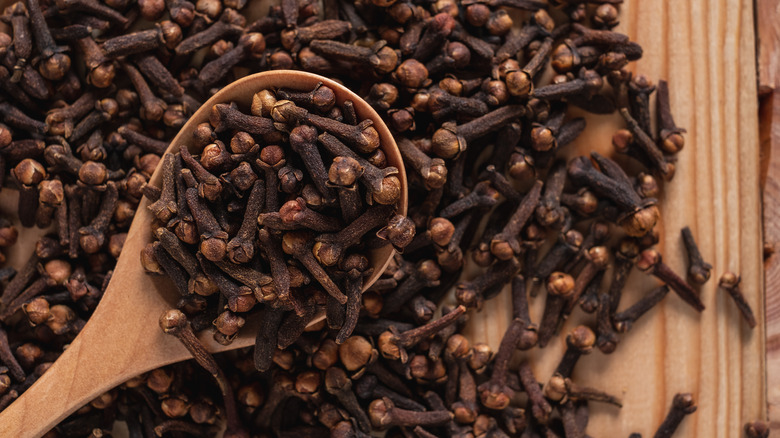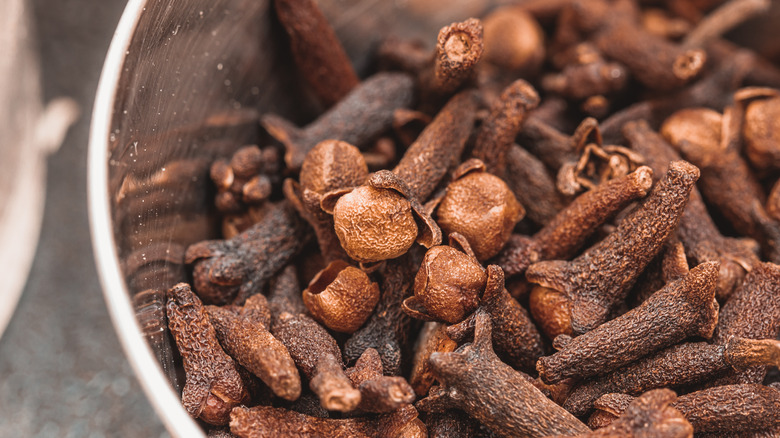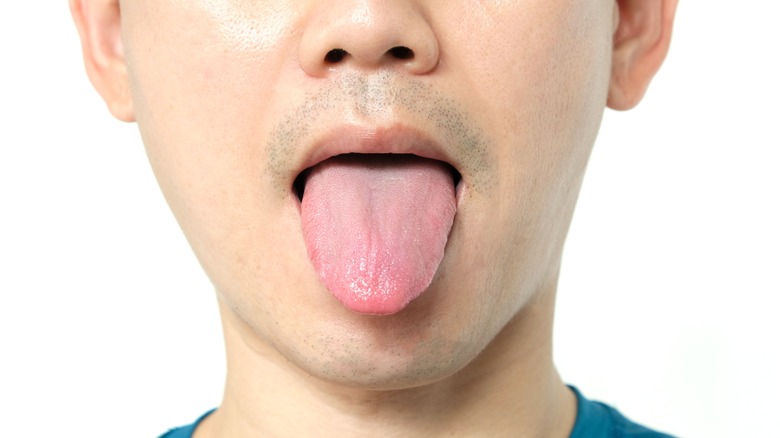8 Reasons To Be Careful When Cooking With Whole Cloves
Cloves are a delicious spice with flavors most commonly associated with fall festivities and foods. You might also think of a baked ham studded with these little gems, a common occurrence for the Easter holiday. But there are some things you need to know to use this particular spice safely and successfully.
McCormick Science Institute explains that cloves are a powerful spice. They are the dried, unopened buds of an evergreen tree that grows predominantly in Indonesia. Each of these tiny forms are comprised of 15-20% essential oil. Besides being used in cooking, they can also be used to decorate oranges, creating a pomander that fragrances a room and can help keep flies at bay.
Cloves do expire, but in their whole form they will last about four years, so it's best to keep your cloves whole until you're ready to use them. Store them in airtight jars, out of the light, and at room temperature. It's also best to buy them in glass jars if you plan to purchase them whole, as their essential oils can break down and degrade plastic. There are some things you should be concerned with when it comes to consuming cloves: Medical complications could arise, or there could be other unpleasant side effects. Learning how to avoid them is crucial to enjoying this spice without consequences.
1. Cloves are a choking hazard
Whole cloves get their name from the Latin word for nail because they resemble them, according to Dr. Killigan's. They are also hard and sharp, so you or your dinner guests could end up choking on one if you leave them in the foods you serve. So, while they may look beautiful studding your Easter ham or other meats, you need to remove them before serving or ensure those eating the foods know to do so.
Besides the risk of cutting off your air supply, swallowing a whole clove could be an unpleasant experience. Cloves will soften as they cook in your meat or in the other items you've chosen to use them in. This could make them soft enough that they will not lodge in your throat or obstruct your airway. But having one caught in your throat can still be painful and take considerable time to dislodge. The prolonged exposure while it is stuck there could also cause additional problems as chemical compounds in the cloves could be continually released and wreak havoc.
2. Cloves can overpower other flavors
The cloves' flavor is lovely, warm, and a little Christmas-y. But it can be easy to go overboard. You want your food to have the flavor of cloves, but you don't want that to be the only thing you taste in your food, so you need to use them sparingly. As Foreign Fork explains, cloves work equally well with sweet or savory dishes. They should be a little sweet and spicy when appropriately used.
And while it can be easy to overdo, there are a few ways to fix things if you have (via Spiceography). Consider diluting your over-spiced dish by creating a second clove-free batch and mixing the two. Or add dairy, sweetener, cinnamon, tomato sauce, or garlic. What you add will be determined by the makeup of the dish you are trying to fix. Be careful using garlic as a countermeasure, however. Because garlic also has a strong flavor, you could end up with a dish that tastes entirely like garlic. Then you may have to start the process of evening out your flavors all over again.
3. There are possible drug interactions
This is where things start to get a little scarier. An overwhelming clove flavor is an inconvenience at best, and if someone is choking, you or someone else at the table is likely to notice. But if you are eating with friends or acquaintances, you may not know all the medications they are taking. In that case, it's best to ask before using them or skip the cloves altogether. Some very scary things could go wrong when eugenol, a chemical substance found in cloves, interacts with certain prescription drugs.
According to WebMD, you should specifically skip cloves, especially in large quantities, if you are on Warfarin or other blood thinners. Like Warfarin, eugenol is a blood thinner, albeit a natural one. Combining the two could lead to an inability of the blood to clot properly, which poses many serious risks. Warfarin and other prescription blood thinners are designed to prevent clots from forming that could lead to stroke, heart attack, or pulmonary embolism (per Cleveland Clinic).
In the proper doses, these drugs can work wonders. But when mixed with other blood thinners, it could have disastrous effects. Whole cloves in small quantities are likely safe. Clove oil poses a more significant risk, but if you use a blood thinner, it is probably safest to avoid recipes that are heavy on whole cloves, too.
4. Cloves can cause bleeding disorders
Even if you don't take Warfarin, whole cloves could still cause problems. Because eugenol thins the blood, and whole cloves have a high concentration of the chemical, excess use of cloves can cause bleeding issues or even disorders. Healthify Me points out that unwanted bleeding can result from using whole cloves in large quantities or clove oil in general because it contains exceptionally high amounts of eugenol.
There are specific times when you should avoid cloves and the eugenol they contain. If you have an upcoming surgery, it's wise to keep away from cloves. The last thing you want to do before going into surgery is to ingest anything that could cause excess bleeding.
You need to take care with cloves even if you aren't preparing to go under the knife. Anything that thins the blood causes risks in case of falls, car accidents, or other injuries. Those that might be survivable under ordinary circumstances could have devastating consequences if the blood has been thinned from regular consumption of whole cloves or clove oil.
5. Your tongue could go numb
According to McCormick Science Institute, the possibility of cloves causing your tongue to go numb is also a result of the eugenol. It can happen when you over-season or use too many whole cloves. But it also occurs because the chemical compound is a natural anesthetic. It's one of the medicinal uses of this particular spice. The traditional therapeutic use of cloves is to treat toothache. It works because it numbs the affected area. But using too many whole cloves could lead to numbness in your tongue. Biting down on a whole clove could have this same effect since it is how cloves were used to treat dental issues.
The clove's bud contains the most eugenol (via Foreign Fork) and the most potent flavor. Even if you are purchasing ground cloves, there are things you should look for to ensure the highest quality. Look for ground cloves that are reddish-brown in color. The lighter the shade of your ground cloves, the likelier they are to contain stems rather than buds. This will result in a subpar flavor in your ground cloves.
6. You will need to cook your food longer
It takes much longer for whole cloves to infuse their flavor into your food than powdered or ground cloves. Depending on what you're making, this could be a deal breaker. If you decide to use ground cloves, the fresher they are, the better. Spiceography explains that it is ideal to grind whole cloves immediately and add them directly to the food you are preparing.
Ground cloves are also easier to use since little prep work is involved. Even if you are grinding them yourself, the only thing you have to do after that is to add them to the dish you're cooking. When using whole cloves, they are best used by studding meats and vegetables. Studding an onion with cloves and adding it to broth makes for a wonderfully seasoned soup base. Putting them into your ham allows the flavors to be released into the meat while it slowly roasts in the oven.
But you will need to remove the onion from your soup and the cloves from your meat before you serve them. Failing to do so could lead to tongue numbness, choking, or just the unpleasant sensation of biting down on a whole hard clove.
7. Cloves can cause or exacerbate hypoglycemia
Cloves are beneficial for people with diabetes because they can help lower blood sugar. But for people who don't have diabetes, or those who consume too many cloves, the inverse could be true. According to Nourish by WebMD, cloves could lower your blood sugar too much, causing hypoglycemia, meaning you must be careful not to use them too frequently or too heavily in your meals.
Doctors may recommend cloves to those with diabetes or prediabetes because the spice can help naturally reduce blood sugar. But cloves could do more harm than good if your blood sugar is already at acceptable levels. Hypoglycemia, or "a low blood sugar event," occurs when blood sugar drops below 70 mg per deciliter (per the National Institute of Diabetes and Digestive and Kidney Diseases). This is most common in people with diabetes. While the risks of consuming cloves are higher for those with pre-existing conditions, they still exist for others, and proper care and consideration should be taken when using them to prepare your meals.
8. Cloves could damage gum tissue
While clove oil and whole cloves have been used to treat toothache, using too much can harm your teeth and gums. Keep this in mind when cooking with whole cloves, as you could inadvertently cause harm. Medical News Today suggests that repeated use of dry cloves or clove oil can dry out gums and cause sensitivity and even damage over time. Damage could also occur to the tooth pulp and mucous membranes.
There are a few different ways to use cloves for toothache treatment safely, and varying the way you use them could help avoid causing further harm. The traditional means of using cloves to treat a toothache is to hold whole cloves in your mouth until they soften, then crush them with the non-affected teeth to release the eugenol that will help numb the ache (via Carrum Downs Dental). If this doesn't sound like something you're willing to try, you could boil them into tea. Just remember that using too much clove can make things worse instead of better and that a toothache ultimately needs professional treatment.








